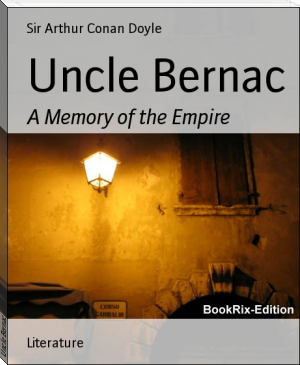Uncle Bernac: A Memory of the Empire by Arthur Conan Doyle (best ebook reader for surface pro .txt) 📗

- Author: Arthur Conan Doyle
Book online «Uncle Bernac: A Memory of the Empire by Arthur Conan Doyle (best ebook reader for surface pro .txt) 📗». Author Arthur Conan Doyle
He sat down, and stretched his plump, white-clad legs towards the fire. Through the blackened shreds of the English papers the red glow beat upwards upon the beautiful, pallid, sphinx-like face—the face of a poet, of a philosopher—of anything rather than of a ruthless and ambitious soldier. I have heard folk remark that no two portraits of the Emperor are alike, and the fault does not lie with the artists but with the fact that every varying mood made him a different man. But in his prime, before his features became heavy, I, who have seen sixty years of mankind, can say that in repose I have never looked upon a more beautiful face.
'You have no dreams and no illusions, Talleyrand,' said he. 'You are always practical, cold, and cynical. But with me, when I am in the twilight, as now, or when I hear the sound of the sea, my imagination begins to work. It is the same when I hear some music—especially music which repeats itself again and again like some pieces of Passaniello. They have a strange effect upon me, and I begin to Ossianise. I get large ideas and great aspirations. It is at such times that my mind always turns to the East, that swarming ant-heap of the human race, where alone it is possible to be very great. I renew my dreams of '98. I think of the possibility of drilling and arming these vast masses of men, and of precipitating them upon Europe. Had I conquered Syria I should have done this, and the fate of the world was really decided at the siege of Acre. With Egypt at my feet I already pictured myself approaching India, mounted upon an elephant, and holding in my hand a new version of the Koran which I had myself composed. I have been born too late. To be accepted as a world's conqueror one must claim to be divine. Alexander declared himself to be the son of Jupiter, and no one questioned it. But the world has grown old, and has lost its enthusiasms. What would happen if I were to make the same claim? Monsieur de Talleyrand would smile behind his hand, and the Parisians would write little lampoons upon the walls.'
He did not appear to be addressing us, but rather to be expressing his thoughts aloud, while allowing them to run to the most fantastic and extravagant lengths. This it was which he called Ossianising, because it recalled to him the wild vague dreams of the Gaelic Ossian, whose poems had always had a fascination for him. De Meneval has told me that for an hour at a time he has sometimes talked in this strain of the most intimate thoughts and aspirations of his heart, while his courtiers have stood round in silence waiting for the instant when he would return once more to his practical and incisive self.
'The great ruler,' said he, 'must have the power of religion behind him as well as the power of the sword. It is more important to command the souls than the bodies of men. The Sultan, for example, is the head of the faith as well as of the army. So were some of the Roman Emperors. My position must be incomplete until this is accomplished. At the present instant there are thirty departments in France where the Pope is more powerful than I am. It is only by universal dominion that peace can be assured in the world. When there is only one authority in Europe, seated at Paris, and when all the kings are so many lieutenants who hold their crowns from the central power of France, it is then that the reign of peace will be established. Many powers of equal strength must always lead to struggles until one becomes predominant. Her central position, her wealth and her history, all mark France out as being the power which will control and regulate the others. Germany is divided. Russia is barbarous. England is insular. France only remains.'
I began to understand as I listened to him that my friends in England had not been so far wrong when they had declared that as long as he lived—this little thirty-six year old artilleryman—there could not possibly be any peace in the world. He drank some coffee which Constant had placed upon the small round table at his elbow. Then he leaned back in his chair once more, still staring moodily at the red glow of the fire, with his chin sunk upon his chest.
'In those days,' said he, 'the kings of Europe will walk behind the Emperor of France in order to hold up his train at his coronation. Each of them will have to maintain a palace in Paris, and the city will stretch as far as Versailles. These are the plans which I have made for Paris if she will show herself to be worthy of them. But I have no love for them, these Parisians, and they have none for me, for they cannot forget that I turned my guns upon them once before, and they know that I am ready to do so again. I have made them admire me and fear me, but I have never made them like me. Look what I have done for them. Where are the treasures of Genoa, the pictures and statues of Venice and of the Vatican? They are in the Louvre. The spoils of my victories have gone to decorate her. But they must always be changing, always chattering. They wave their hats at me now, but they would soon be waving their fists if I did not give them something to talk over and to wonder at. When other things are quiet, I have the dome of the Invalides regilded to keep their thoughts from mischief. Louis XIV. gave them wars. Louis XV. gave them the gallantries and scandals of his Court. Louis XVI. gave them nothing, so they cut off his head. It was you who helped to bring him to the scaffold, Talleyrand.'
'No, Sire, I was always a moderate.'
'At least, you did not regret his death.'
'The less so, since it has made room for you, Sire.'
'Nothing could have held me down, Talleyrand. I was born to reach the highest. It has always been the same with me. I remember when we were arranging the Treaty of Campo Formio—I a young general under thirty—there was a high vacant throne with the Imperial arms in the Commissioner's tent. I instantly sprang up the steps, and threw myself down upon it. I could not endure to think that there was anything above myself. And all the time I knew in my heart all that was going to happen to me. Even in the days when my brother Lucien and I lived in a little room upon a few francs a week, I knew perfectly well that the day would come when I should stand where I am now. And yet I had no prospects and no reason for any great hopes. I was not clever at school. I was only the forty-second out of fifty-eight. At mathematics I had perhaps some ability, but at nothing else. The truth is that I was always dreaming when the others were working. There was nothing to encourage my ambition, for the only thing which I inherited from my father was a weak stomach. Once, when I was very young, I went up to Paris with my father and my sister Caroline. We were in the Rue Richelieu, and we saw the king pass in his carriage. Who would have thought that the little boy from Corsica, who took his hat off and stared, was destined to be the next monarch of France? And yet even then I felt as if that carriage ought to belong to me. What is it, Constant?'
The discreet valet bent down and whispered something to the Emperor.
'Ah, of course,' said he. 'It was an





Comments (0)